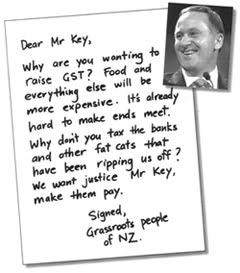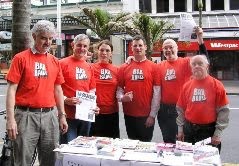by Paola Harvey
from Green Left Weekly (Australia)
30 January 2010
Although New Zealand, like Australia, has not been as badly affected by the global economic crisis as the US or Europe, workers are facing hardship.
Bronwen Beechey, an activist from Socialist Worker New Zealand (SWNZ), told Green Left Weekly: “There’ have been a lot of redundancies, places have been closed down.”
Beechey and SWNZ activist Peter Hughes were in Sydney to attend the January 3-6 Socialist Alliance national conference. They spoke to GLW about the SWNZ’s “bad banks” campaign, which takes aim at the cause of the global financial crisis — neoliberal capitalism.
“For people on low incomes life’s just been getting tougher because [they are] losing their jobs and food prices and rents and all of it have not come down substantially”, Beechey said.
“All the indicators, the social services, people asking for assistance, for food parcels, people losing their homes — they’ve all skyrocketed.”
Hughes said employers have used the crisis to justify attacking workers’ wages and conditions. “In the last 12 months, there have been no less than eight lockouts of workers.
“One of the most shameful examples was a service provider for the elderly that insisted that if the workers in that field did not accept the minimum wage [NZ$12.50 per hour] they’d be locked out.
“That’s quite a serious indication of how they [the bosses] see the crisis being resolved to their advantage and workers’ disadvantage.”
The New Zealand government’s response has been the same as capitalist governments around the world — bail out the banks and the big capitalists, and make the workers pay.
But they are not getting it all their own way. The government’s attempt to impose an unofficial wage freeze in the public service was recently challenged. Support staff in the education sector won a small wage rise.
That win will set the tone for the upcoming nurses’ and general education unions’ wage negotiations. “No less than that, will be the call, I’m sure”, said Hughes. “So that’s a good sign.
“I heard at the [Socialist Alliance] conference, that [Australian Prime Minister Kevin Rudd] said that the recovery’s going to be worse than the recession.
“I’m quite sure that’s their intention for us in New Zealand as well, working people will be made to pay for the recovery — if there’s going to be one.
“But our assessment is that there can be no real recovery in the current market economy, not in the foreseeable future. That’s going to lead to all sorts of crises for them, which they will try to push on us.
“We have to organise people to resist that.”
The discussion about neoliberalism at the NZ Council of Trade Unions’ 2009 conference has opened up more space on the left to fight back against these future crises.
At the conference, union activists talked about workers’ cooperatives, building and strengthening the union movement and not accepting the neoliberal capitalist model as the only option.
Beechey said: “It also talk[ed] about climate change and the need for an alternative economic strategy which is an implicit criticism of neoliberal capitalism.”
Hughes added: “While it’s not a policy position as such, it’s a discussion that’s been opened up within the trade union movement.
“It’s not an accepted policy, it could be watered down significantly and it’ll come down to how different unions interpret that for building a broader perspective in the membership.
“[But] when you think about how closely linked the trade union movement has been to the Labour Party … this is a departure.
“The fact that they’re daring to criticise publicly this position opens up a space on the left for us to work with trade union activists in a much more healthy and progressive way.”
Many people in New Zealand continue to struggle with little indication of their situation improving in the near future.
There has been an increase in the number of houses sold due to people defaulting on their home loans. A large proportion of these have been people with one home — not property speculators.
Hughes said the defaulters “simply cannot pay because they’ve lost their job, they’ve been made redundant and they have reduced incomes”.
“That’s pretty devastating for families and has shown no sign of abating at all.”
The actions of the banks have been completely shameful. Before the crisis, banks were advertising loans for 100% of the price of a house.
But after the crisis, their ruthless approach to lending has meant many people who were lured into the property market by these loans have had their home repossessed.
“Our campaign around ‘bad banks’ is trying to make them pay really”, said Hughes. “Because they’re the ones that have played a big role [in the crisis] and they’re plundering the profits of working people.”
The bad banks campaign is focusing on demystifying what the banks actually do and how they caused the financial crisis. It is also calling for a financial transaction tax, as opposed to a goods and services tax.
A GST is a regressive tax, that is it affects the poorest the most, because the poor are taxed the same as the rich for goods despite having less ability to pay.
A financial transaction tax, on the other hand, would be a progressive tax. It would affect banks, corporations and the wealthy the most, because they account for the vast majority of financial transactions.
“We see the bad banks campaign as striking right to the heart of neo-liberalism”, Hughes said. “These banks have got their fingers in the lives of every working class person, whether it’s controlling their mortgage, their credit card, or their bank charges.
“They’re bloody pillaging basically. Their pockets are huge, they’re not paying their taxes.
“They’re not very popular with workers at the moment.”
Subscribe to:
Post Comments (Atom)





No comments:
Post a Comment